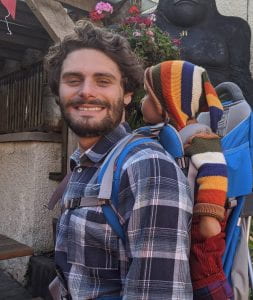Inspired by the Big Issue’s regular feature Letter to My Younger Self, we’re asking staff to think back to their own experiences as a student and tell us what advice they would give to their undergraduate selves.
This month we hear from Lewis Coyne, Study Skills Tutor.
What and where did you study?
I first studied at Cardiff University for a BA in Philosophy and English Literature, followed by an MA in Analytic and Modern European Philosophy. Then I switched to the University of Exeter, where I got an MRes in Science and Technology Studies and a PhD in social philosophy.
Did you experience culture shock when you started university?
Yes – but I didn’t think so at the time. I had an elder brother at university, so broadly knew what to expect, and had travelled around Australasia on a gap year with friends, so thought I could look after myself. But on reflection I wasn’t fully comfortable with taking charge of and being accountable for my actions, as I had a terrible work ethic, appalling diet, and complete inability to get out of bed before 10am. This was amplified by the fact that, as a humanities student, I only had about two contact hours a day – meaning that my work was almost entirely self-directed and the structure of my day self-imposed. I really struggled to adjust to that, and as a result most of my first year was a mess!
What was your biggest failure and what did you learn from it?
My biggest failure was probably all of my first term: I didn’t do much reading (a major problem when you’re studying English Literature!), which led to not going to seminars very often, which in turn led to some shocking last-minute essays that thoroughly deserved the low marks they received. (Just thinking about the poor people who had to mark them makes me cringe, even now.)
What I learned was that I had to take university seriously, and as part of that re-discover how to properly apply myself to my education. I hadn’t enjoyed school a great deal, and from the age of 14 tended to do just enough to get by without excessively disappointing my parents. This carried on through to the beginning of my undergraduate degree. But by the end of my first year I’d found, for the first time I could remember, that learning could be immensely enriching – even enjoyable. That late discovery probably explains why I carried on all the way to PhD level! I should note that I didn’t make that switch in isolation, though: I was helped enormously by the positive influence of my then-girlfriend, now wife, who is a far more diligent, switched-on, and all-round better person than me.
What are you most proud of about your time at university?
From those inauspicious beginnings I went on to win a departmental prize for the highest-performing undergraduate in Philosophy. (Needless to say, I wouldn’t have won it if first-year marks counted toward the final degree classification!) It was quite the turnaround, and I’m still proud of that now.
What was the best bit of feedback you received?
I used to find getting feedback on anything I’d written a horrible experience, regardless of whether it was broadly positive or negative, in-person or in writing. I knew in the abstract that feedback was a useful, even necessary part of learning, but I just found receiving it excruciating. Over time, though, I learned to get over that anxiety and actually listen to the feedback I was getting, and this only came through the process of being given it repeatedly. For that reason I wouldn’t say there was a single best bit of feedback I received – it was nearly always useful in training me to be more comfortable with it.
What advice would you give to your undergraduate self?
The thing is, when I arrived at university I was such an arrogant twerp that I probably wouldn’t have listened to any advice, even from my future self. So what I would do instead is just talk to younger-me, explore what I enjoyed about the subjects I was studying, point out that it was a more stimulating form of education than school had ever been, and basically just try to gently encourage the process of self-development that my undergraduate years ended up being.

